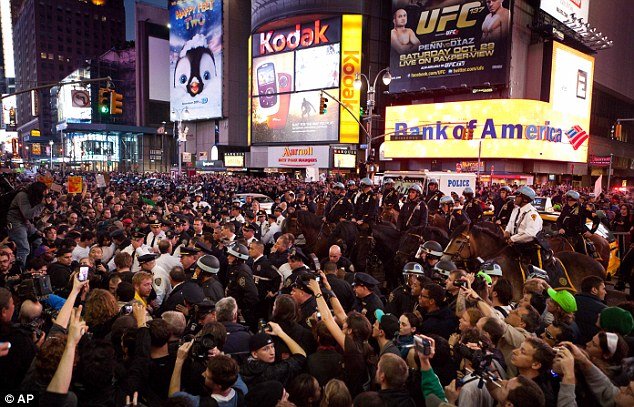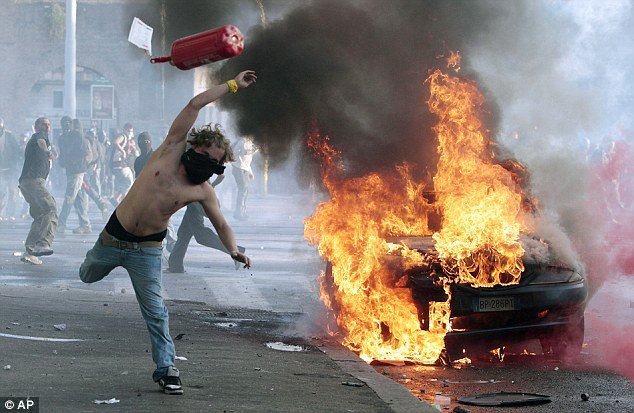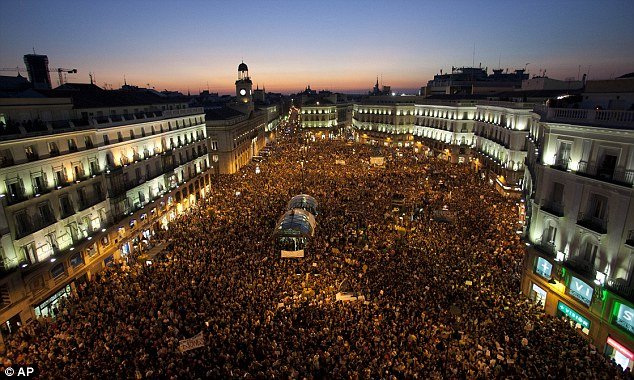
New York police has arrested more than 70 people yesterday in Times Square during a march of 20,000 of Occupy Wall Street protesters from the city’s Financial District to midtown Manhattan.
The demonstrators swamped Times Square, stopping traffic, in what was thought to be the largest Occupy demonstration in the U.S. so far.
The arrests come one day after the Zuccotti Park’s owner backed down from an attempt to move the demonstration.
Many of the Occupy demonstrators in the iconic square of New York City came from around US and did not come up from the encampment.

Meanwhile, other demonstrators held marches across the world. Hundreds of thousands of people gathered at more than 950 demonstrations in more than 80 countries as Occupy protesters marked four weeks since the rallies against the global financial system began.
In New York, the place where the protests first started, 20,000 of people are preparing to occupy Times Square in what is being called “The Occupation Party”.
In Rome, shop and car windows were smashed, reporters attacked and at least two cars were torched as the global “day of rage” erupted into violence. Others burned Italian and European Union flags.
Italian police fired tear gas and water cannons as protesters who had smashed shop and bank windows, torched cars and hurled bottles.

The Rome demonstration came a day after Premier Silvio Berlusconi barely survived a confidence vote as Italy, with a national debt ratio second only to Greece in the 17-nation eurozone, is rapidly becoming a focus of concern in Europe’s debt crisis. Italian government has passed a 60 billion-euro austerity package that has raised taxes and will make public health care more expensive.
Demonstrators worldwide shouted their rage against bankers and politicians they accuse of ruining economies and condemning millions to hardship through greed and bad government but most other protests were carried off peacefully.
The Occupy movement protests began in New Zealand, rippled round the world to Europe, before returning to the starting point in New York.
One of the biggest gatherings was seen in Spain where 60,000 people joined demonstrations in Madrid’s Puerta del Sol and 20,000 marched through Seville.

Several hundred people marched up the main street in Auckland, New Zealand’s biggest city, joining a rally at which 3,000 chanted and banged drums, denouncing corporate greed.
Other 200 gathered in the capital Wellington and 50 in a park in the earthquake-hit southern city of Christchurch.
In Sydney, Australia, about 2,000 people, including representatives of Aboriginal groups, communists and trade unionists, protested outside the central Reserve Bank of Australia. About 1,000 gathered in Melbourne.
In Tokyo, hundreds marched on the streets of Japanese capital, including anti-nuclear protesters.
Participants marched outside the Tokyo Electric Power Co., which operates the tsunami-hit Fukushima Daiichi nuclear plant, chanting anti-nuclear slogans, while opposing the U.S.-led Trans-Pacific Partnership free trade bloc that Japan is considering joining.
In Philippines, about one hundred people marched on Manila’ streets in front of the U.S. embassy under the Philippine left-wing alliance, Bayan, waving banners reading: “Down with U.S. imperialism” and “Philippines not for sale”.
In Taiwan, more than 100 people gathered at the Taipei stock exchange, chanting “we are Taiwan’s 99 percent”, and saying economic growth had only benefited companies while middle-class salaries barely covered soaring housing, education and healthcare costs.
In UK, protesters also converged on the City of London under the banner “Occupy the Stock Exchange”.
In Greece, protesters called an anti-austerity rally for Saturday in Athens’ Syntagma Square.
In France, protests were expected in Paris to coincide with the G20 finance chiefs’ meeting there.
In Germany, where sympathy for southern Europe’s debt troubles is patchy, the financial centre of Frankfurt and the European Central Bank in particular are expected to be a focus of marches called by the Real Democracy Now movement.
In South Korea, activists began gathering on the streets of Seoul with the country’s paper, the Korea Herald reporting that a coalition of 30 local civic groups planned to hold a two-day protest in the main financial district of Yeouido and other parts of the capital.
Seoul police warned that damaging public facilities, occupying roads and assaulting police officers would not be tolerated, the Korea Herald reported.
In Canada, protests were planned for Saturday in cities including Montreal and Vancouver. In Toronto, demonstrators plan to gather at Canada’s main stock exchange.
[youtube 0aMD4QIvGUE]
[youtube eXJqj4iXg8o]
[youtube 73gtsiWu8g4]